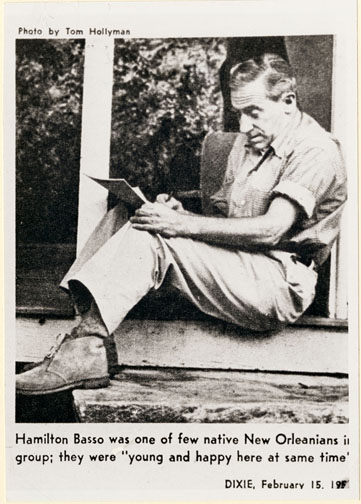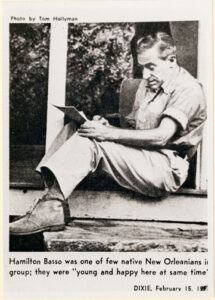Hamilton Basso
New Orleans-born Hamilton Basso was an influential novelist and journalist, as well as part of the southern literary renaissance.

Courtesy of The Historic New Orleans Collection
Hamilton Basso. Hollyman, Tom (Photographer)
Joseph Hamilton Basso (who went by the name Hamilton) was an influential journalist and the author of eleven novels. While writing for New Republic, Time, Saturday Review, and the New Yorker, among other publications, Basso published novels, most set in either Louisiana or South Carolina. Throughout his writing, Basso attempted to refute romantic myths of the old South by portraying minorities—women, foreigners, and people of color—realistically rather than stereotypically. Basso is best known for his popular 1954 novel The View from Pompey’s Head, part of an unfinished trilogy that includes the novel The Light Infantry Ball. The latter was nominated for the 1960 National Book Award. Basso was also the winner of the 1940 Southern Authors Award for his fourth novel, Days Before Lent.
Born September 5, 1904, in New Orleans, Basso was the son of Italian Americans. In 1922, he enrolled in Tulane University to study law. While at Tulane, he became friends with a group of aspiring writers living in New Orleans, including William Faulkner, Sherwood Anderson, Lyle Saxon, and Edmund Wilson, each of whom contributed to the Double Dealer, a magazine subtitled “The National Magazine of the South.” Inspired by his conversations with these writers, Basso dropped out of Tulane in 1926, three months before his scheduled graduation, to begin a career as a journalist. He went to work as a reporter for the New Orleans Morning Tribune, the New Orleans Item, and finally the New Orleans Times-Picayune, where he became the night city editor.
Encouraged by his friends at the Double Dealer, Basso published his first novel, Relics and Angels, in 1929. In 1930, he married Etolia Moore Simmons, with whom he had a son. A biography of Confederate general P. G. T. Beauregard, Beauregard: The Great Creole, soon followed and won its author critical acclaim. Basso also worked for New Republic, frequently writing about the South, and in 1935 he became its associate editor.
In the early 1940s, Basso moved to New York, where he wrote for Time magazine and then the New Yorker, where he worked as associate editor from 1944 to 1961. In the 1950s, two of his novels, Days Before Lent (retitled Holiday for Sinners) and The View From Pompey’s Head, were made into movies. Basso also wrote a book of travel sketches titled A Quota of Seaweed and edited a reissue of W. L. Herndon’s 1842 Exploration of the Valley of the Amazon. He also edited The World from Jackson Square, a collection of essays about New Orleans, with his wife. He was elected to the National Institute of Arts and Letters, where he also served as vice president.
Basso died in New Haven, Connecticut, on May 13, 1964. Today his work is frequently studied within the context of the southern literary renaissance, a sudden outpouring of literature by southern writers between World War I and the end of World War II. Like many of his colleagues at the Double Dealer, often cited as key players in the renaissance, Basso’s writing shows a willingness to critically examine his region of birth. Frequently, Basso expressed his criticism through a protagonist who, in many of his novels, returns to the South (after living somewhere else) and encounters social injustice. Unlike writers who romanticized the antebellum plantation South and its aristocratic traditions, Basso and his cohorts expressed a desire to see change and progress, particularly in terms of race relations.
